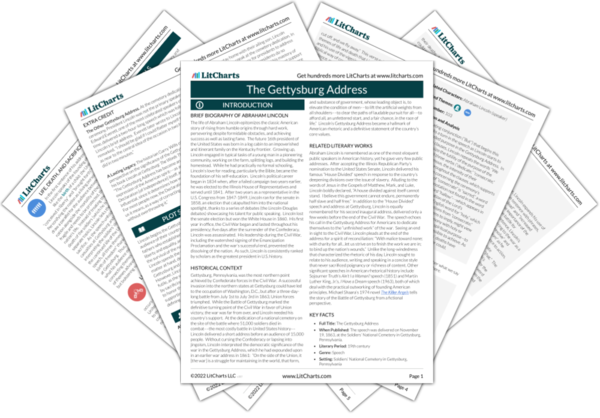In the first sentence of his address at Gettysburg, Lincoln speaks of the founding of the United States like the birth of a child: the United States is a nation “conceived in liberty” and “brought forth” by “our fathers.” Personifying the nation as a living person allows Lincoln to draw a parallel for the audience between the mortality of the nation alongside the mortality of the soldiers. If human life is fragile and needs to be protected, the same is true for the nation’s life. Instead of treating the life of the nation and the death of the soldiers (which he is tasked to commemorate) as separate topics, Lincoln links the two through the theme of sacrifice. As the speech unfolds, Lincoln contextualizes the casualties at Gettysburg and the tragedy of the Civil War by interpreting the soldiers’ deaths as sacrifices offered to ensure the continued life of the United States. At the end of the speech, all three themes converge when he envisions “a new birth of freedom” thanks to the sacrificial deaths of the soldiers at Gettysburg. Thus, Lincoln gives meaning and significance to what his audience might perceive as senseless bloodshed by connecting themes of life and death with sacrifice. This linking of themes advances his purpose of not only honoring the dead but bolstering support for the war and national values.
Life, Death, and Sacrifice ThemeTracker

Life, Death, and Sacrifice Quotes in The Gettysburg Address
…our fathers brought forth, on this continent, a new nation, conceived in liberty, and dedicated to the proposition that all men are created equal.

Unlock explanations and citation info for this and every other The Gettysburg Address quote.
Plus so much more...
Get LitCharts A+But, in a larger sense, we cannot dedicate, we cannot consecrate—we cannot hallow—this ground.
The world will little note, nor long remember what we say here, but it can never forget what they did here.
It is rather for us to be here dedicated to the great task remaining before us—that from these honored dead we take increased devotion to that cause for which they here gave the last full measure of devotion—that we here highly resolve that these dead shall not have died in vain—that this nation, under God, shall have a new birth of freedom, and that government of the people, by the people, for the people, shall not perish from the earth.











